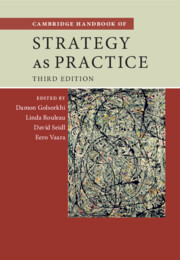Book contents
- Cambridge Handbook of Strategy as Practice
- Cambridge Handbook of Strategy as Practice
- Copyright page
- Contents
- Figures
- Tables
- Boxes
- Contributors
- Preface to the Third Edition
- Introduction: What Is Strategy as Practice?
- Part I Ontological and Epistemological Questions
- Chapter 1 Epistemological Alternatives for Researching Strategy as Practice: Building and Dwelling Worldviews
- Chapter 2 How Is Strategy Made? A Heideggerian Onto-Epistemological Framework for Studying Strategy as Practice
- Chapter 3 Constructivist Paradigms and Their Relevance for Strategy-as-Practice Research
- Chapter 4 The Ongoing Challenge of Developing Cumulative Knowledge about Strategy as Practice
- Chapter 5 Practical Relevance of Practice-Theoretical Research on Strategy
- Part II Theoretical Resources: Social Theory
- Part III Theoretical Resources: Organization and Management Theories
- Part IV Methodological Resources
- Part V Substantive Topic Areas
- Index
- References
Chapter 2 - How Is Strategy Made? A Heideggerian Onto-Epistemological Framework for Studying Strategy as Practice
from Part I - Ontological and Epistemological Questions
Published online by Cambridge University Press: 11 March 2025
- Cambridge Handbook of Strategy as Practice
- Cambridge Handbook of Strategy as Practice
- Copyright page
- Contents
- Figures
- Tables
- Boxes
- Contributors
- Preface to the Third Edition
- Introduction: What Is Strategy as Practice?
- Part I Ontological and Epistemological Questions
- Chapter 1 Epistemological Alternatives for Researching Strategy as Practice: Building and Dwelling Worldviews
- Chapter 2 How Is Strategy Made? A Heideggerian Onto-Epistemological Framework for Studying Strategy as Practice
- Chapter 3 Constructivist Paradigms and Their Relevance for Strategy-as-Practice Research
- Chapter 4 The Ongoing Challenge of Developing Cumulative Knowledge about Strategy as Practice
- Chapter 5 Practical Relevance of Practice-Theoretical Research on Strategy
- Part II Theoretical Resources: Social Theory
- Part III Theoretical Resources: Organization and Management Theories
- Part IV Methodological Resources
- Part V Substantive Topic Areas
- Index
- References
Summary
Haridimos Tsoukas develops the argument of Chia and Rasche further. In line with earlier works by Chia (Chia and Holt 2006; Chia and MacKay 2007; MacKay, Chia and Nair 2021), he argues that strategy as practice researchers need to adopt a real practice ontology if they wanted to go beyond the process approach in strategy. He supports the call for a clear break with methodological individualism in favour of a view that gives primacy to practice. Yet he warns about pushing research too much in the opposite direction, where strategy is treated as emergent by definition. Instead, we need to reconcile – from a practice-based approach – the possibility of both non-deliberate and deliberate types of action in strategy. Drawing on Heidegger’s philosophy, he develops a framework that distinguishes between four different types of actions according to the involved form and degree of intentionality: (1) ‘practical coping’ (based on tacit understandings); (2) ‘deliberate coping’ (based on explicit awareness); (3) ‘detached coping’ (based on thematic awareness); and (4) ‘theoretical coping’ (based on theoretical understanding). These four forms of action are then linked to four forms of strategy making.
- Type
- Chapter
- Information
- Cambridge Handbook of Strategy as Practice , pp. 42 - 62Publisher: Cambridge University PressPrint publication year: 2025

